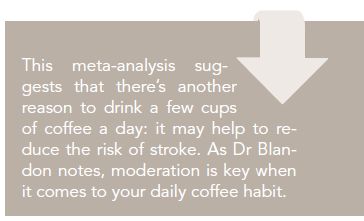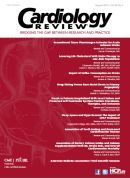Publication
Article
Cardiology Review® Online
Impact of Coffee Consumption on Stroke

Jimena A. Blandon, MD
Review

D’Elia L, Cairella G, Garbagnati F, Scalfi L, Strazzullo P. Moderate coffee consumption is
associated with lower risk of stroke: meta-analysis of prospective studies. Presented at the
European Society of Hypertension, May 11, 2012, London. [Abstract e107].
Stroke is a devastating disease that constitutes the third leading cause of death in the United States. Even though the prevalence of stroke has decreased dramatically in the last 20 years due to better diagnosis and control of hypertensive patients, there are still many aspects of the disease that remain to be improved, including prevention and effective treatment strategies.

Coffee is one of the most widely consumed drinks in the world, but has been associated with drawbacks such as high concentrations of caffeine, transient increase in blood pressure, and long-term increases in low-density lipoprotein cholesterol levels.1 On the other hand, coffee contains beneficial antioxidants, and recent reports of the association between its consumption and decreased total mortality have been encouraging.1 A new meta-analysis by European researchers on the association between low and moderate coffee consumption and lower risk for stroke adds to myriad beneficial effects for human health reported previously.2
Study Design
The main goal of D’Elia et al’s metaanalysis was to provide a systematic review of studies conducted from 1966 to 2011 published in major online databases that evaluated baseline coffee consumption and risk of stroke in a general population. Patients were divided according to the amount of coffee ingested: Moderate (1 to 3 cups/day), High (3 to 6 cups/day), and Very High (>6 cups/day) and were compared with a reference category (0 to 1 cups/day). A total of 10 cohorts, which encompassed
442,098 participants with a follow-up of 2 to 24 years, had 6962 stroke events. Those in the category of Moderate consumption had a significantly decreased risk of stroke (relative risk [RR], 0.82; 95% confidence interval [CI], 0.74-0.90; P <0.001). In the High consumption group, after excluding one single cohort, there was also a significant
trend toward diminishment of the risk of stroke (RR, 0.79; 95% CI, 0.68-0.92; P <0.003). However, the Very High consumption group was not associated with decreased risk for stroke [RR, 1.00; 95% CI, 0.76-1.32 (P = 0.97)]. The authors also performed an evaluation of publication bias and quantified the heterogeneity between the studies. Subgroup and meta-regression analysis did not detect identifiable sources of heterogeneity.
The authors concluded that moderate coffee consumption was associated with a statistically significant reduction in risk for stroke in the general population, independent of most identifiable confounders.
References
1. Freedman ND, Park Y, Abnet CC, et al. Association of coffee drinking with total and cause-specific mortality. N Engl J Med. 2012;366:1891-1904.
2. Lopez-Garcia E, Rodriguez-Artalejo F, Rexrode KM, et al. Coffee consumption and risk of stroke in women. Circulation. 2009;119:1116-1123.
3. Lopez-Garcia E, van Dam RM, Qi L, et al. Coffee consumption and markers of inflammation and endothelial dysfunction in healthy and diabetic women. Am J Clin
Nutr. 2006;84:888-893.
4. Huxley R, Lee CM, Barzi F, et al. Coffee, decaffeinated coffee, and tea consumption in relation to incident type 2 diabetes mellitus: a systematic review with meta-analysis. Arch Intern Med. 2009;169:2053-2063.
5. Larsson SC, Orsini N. Coffee consumption and risk of stroke: a dose-response meta-analysis of prospective studies. Am J Epidemiol. 2011;174(9):993-1001.
6. Larsson SC, Virtamo J, Wolk A. Coffee consumption and risk of stroke in women. Stroke. 2011;42:908-912.
7. Umemura T, Ueda K, Nishioka K, et al. Effects of acute administration of caffeine on vascular function. Am J Cardiol. 2006;98:1538-1541.
8. Bohn SK, Ward NC, Hodgson JM, et al. Effects of tea and coffee on cardiovascular disease risk. Food Funct. March 29, 2012.
COMMENTARY
Is There a "Coffee Benefit?"
This study added stronger flavor to a growing body of knowledge that suggests major beneficial effects on cardiovascular health are associated with moderate coffee consumption. Those benefits include, but are not limited to, improvement in serum biomarkers of inflammation; decreased insulin resistance;3 lower rates of diabetes,4 injuries, and accidents; and even reductions of total all-cause mortality.1
Other studies have investigated the relationship between coffee and risk of stroke. A similar 2011 study by Larsson and Orsini5 was a meta-analysis of prospective studies conducted to quantitatively assess the association between coffee consumption and stroke risk. Pertinent studies were identified by searching PubMed and Embase from January 1966 through May 2011. Prospective studies in which investigators reported stroke risk reduction for 3 or more categories of coffee consumption
were included. Results from individual studies were pooled using a randomeffects model. Eleven prospective studies, with 10,003 cases of stroke and 479,689 participants, met the inclusion criteria. There was some evidence of a nonlinear association between coffee consumption and risk of stroke (P for nonlinearity = 0.005). Compared with no coffee consumption, the RRs of stroke were 0.86 (95% CI, 0.78-0.94) for 2 cups of coffee per day, 0.83 (95% CI, 0.74-0.92) for 3 to 4 cups/day, 0.87 (95% CI, 0.77- 0.97) for 6 cups/day, and 0.93 (95% CI, 0.79-1.08) for 8 cups/day. Findings from this meta-analysis indicated that moderate coffee consumption may be weakly inversely associated with risk of stroke.5
Interestingly enough, the same authors published data early in 2011 about low or no coffee consumption and increased risk of stroke among 34,670 women without a history of cardiovascular disease or cancer at baseline in 1997 from the Swedish Hospital Discharge Registry.6 During a mean follow-up of 10.4 years, and after adjustment for other risk factors, coffee consumption was associated with a statistically significant lower risk of total stroke, cerebral infarction, and subarachnoid hemorrhage, but not intracerebral hemorrhage. The multivariable RRs of total stroke across categories of coffee consumption (<1 cup/day, 1 to 2 cups/day, 3 to 4 cups/
day, and ≥5 cups/day) were 1.00, 0.78 (95% CI, 0.66-0.91), 0.75 (95% CI, 0.64-0.88), and 0.77 (95% CI, 0.63-0.92, respectively; P for trend = 0.02).6
What would be the mechanism(s) behind these benefits? In a randomized, controlled trial, Japanese authors suggest that the acute administration of caffeine augments endothelium-dependent vasodilatation in healthy young men through an increase in nitric oxide production. 7 In addition, a number of factors such as an improved glucose metabolism, increased reverse cholesterol transport and inhibition of foam cell formation, inhibition of oxidative stress, and effects on platelet function (adhesion and activation, aggregation and clotting) have been suggested to be among coffee’s benefits.8
However, an acute increase in blood pressure, hypercholesterolemia, and increased risk of myocardial infarction keeps open the debate as to whether there should be a clear recommendation for coffee drinkers. It is estimated that 150 million people in the United States drink coffee, and we need more data on the type of coffee consumed
(caffeinated versus decaffeinated), additives used in it (sugars, cream), genetic variations in metabolism, and many other confounders that need to be adjusted before we can definitively say that our stimulating, aromatic, energy-infusing morning cup of coffee is also protecting our brain from strokes. In the meantime, the healthiest thing to do is to avoid extremes like either not drinking any coffee or having more than 5 to 6 cups/day. We are eager to hear more about this coffee paradox! It would be a well-deserved honor for an international, all-time favorite drink to be found to have such benefits.
About the Author
Jimena A. Blandon, MD, is a third-year resident instructor in the Department of Internal Medicine at Texas Tech University Health Sciences Center in El Paso. She received her MD at Universidad del Valle, in Cali, Colombia. Dr Blandon is currently involved in a study of the prevalence and predictors of contrast-induced nephropathy among patients undergoing angiography at the University Medical Center at El Paso, TX, in a predominantly Hispanic population.
